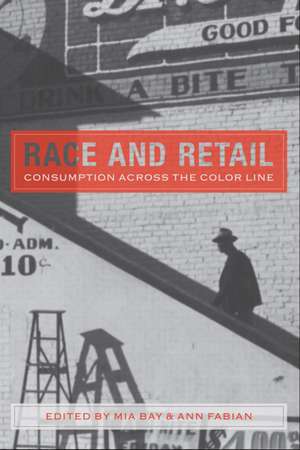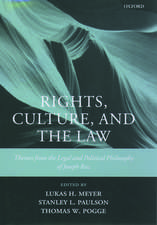Race and Retail: Consumption across the Color Line: Rutgers Studies on Race and Ethnicity
Editat de Professor Mia Bay, Professor Ann Fabian Contribuţii de Naa Oyo A. Kwate, Geraldo L. Cadava, Traci Parker, Bridget Kenny, John W. Heaton, Ellen D. Wu, Neiset Bayouth, Johana Londoño, Erualdo R. González, Stacey A. Sutton, Melissa L. Cooper, Siobhan Carter-David, Jerome D. Williams, Geraldine Rosa Henderson, Sophia R. Evett, Anne-Marie G. Hakstian, Azure B. Thompson, Sharese N. Porteren Limba Engleză Paperback – 4 aug 2015
Race has long shaped shopping experiences for many Americans. Retail exchanges and establishments have made headlines as flashpoints for conflict not only between blacks and whites, but also between whites, Mexicans, Asian Americans, and a wide variety of other ethnic groups, who have at times found themselves unwelcome at white-owned businesses.
Race and Retail documents the extent to which retail establishments, both past and present, have often catered to specific ethnic and racial groups. Using an interdisciplinary approach, the original essays collected here explore selling and buying practices of nonwhite populations around the world and the barriers that shape these habits, such as racial discrimination, food deserts, and gentrification. The contributors highlight more contemporary issues by raising questions about how race informs business owners’ ideas about consumer demand, resulting in substandard quality and higher prices for minorities than in predominantly white neighborhoods. In a wide-ranging exploration of the subject, they also address revitalization and gentrification in South Korean and Latino neighborhoods in California, Arab and Turkish coffeehouses and hookah lounges in South Paterson, New Jersey, and tourist capoeira consumption in Brazil.
Race and Retail illuminates the complex play of forces at work in racialized retail markets and the everyday impact of those forces on minority consumers. The essays demonstrate how past practice remains in force in subtle and not-so-subtle ways.
| Toate formatele și edițiile | Preț | Express |
|---|---|---|
| Paperback (1) | 312.70 lei 6-8 săpt. | |
| Rutgers University Press – 4 aug 2015 | 312.70 lei 6-8 săpt. | |
| Hardback (1) | 830.93 lei 6-8 săpt. | |
| Rutgers University Press – 4 aug 2015 | 830.93 lei 6-8 săpt. |
Preț: 312.70 lei
Nou
Puncte Express: 469
Preț estimativ în valută:
59.83€ • 62.70$ • 49.46£
59.83€ • 62.70$ • 49.46£
Carte tipărită la comandă
Livrare economică 12-26 aprilie
Preluare comenzi: 021 569.72.76
Specificații
ISBN-13: 9780813571706
ISBN-10: 0813571707
Pagini: 324
Ilustrații: 11 photographs, 2 maps, 11 tab
Dimensiuni: 152 x 229 x 23 mm
Greutate: 0.48 kg
Ediția:None
Editura: Rutgers University Press
Colecția Rutgers University Press
Seria Rutgers Studies on Race and Ethnicity
ISBN-10: 0813571707
Pagini: 324
Ilustrații: 11 photographs, 2 maps, 11 tab
Dimensiuni: 152 x 229 x 23 mm
Greutate: 0.48 kg
Ediția:None
Editura: Rutgers University Press
Colecția Rutgers University Press
Seria Rutgers Studies on Race and Ethnicity
Notă biografică
MIA BAY is a professor of history and co-director of the Rutgers Center for Race and Ethnicity at Rutgers University. She is the author of The White Image in the Black Mind: African-American Ideas About White People 1830–1925.
ANN FABIAN is a distinguished professor of history and co-director of the Rutgers Center for Race and Ethnicity at Rutgers University. She is the author of The Skull Collectors: Race, Science, and America’s Unburied Dead.
Cuprins
Contents
Introduction
Part I: Race, Place and Retail Spaces
Chapter 1: Traveling Black /Buying Black: Retail and Roadside Accommodations during the Segregation Era
Chapter 2: Retail Messages in the Ghetto Belt
Chapter 3: The Other Migrants: Mexican Shoppers in American Borderlands
Chapter 4: Southern Retail Campaigns and the Struggle for Black Economic Freedom in the 1950s and 1960s
Chapter 5: Servicing a Racial Regime: Gender, Race and the Public Space of Department Stores in Baltimore, Maryland, and Johannesburg, South Africa, 1940-1970
Part II: Race, Retail and Communities
Chapter 6: Athabascan Village Stores: Subsistence Shopping in Interior Alaska in the 1940s
Chapter 7: Deghettozing Chinatown: Race and Space in Postwar America
Chapter 8: Marketing Identity, Negotiating Boundaries: Ethnic Entrepreneurship in Paterson, New Jersey’s Narghile Lounges
Chapter 9: The Changing Politics of Latino Consumption: Debates in Downtown Santa Ana’s New Urbanist and Creative City Revitalization
Chapter 10: The Spatial Politics of Black Business Closure in Central Brooklyn
Part III: The Inner Landscapes of Racialized Consumption
Chapter 11: Selling Voodoo in Migration Metropolises
Chapter 12: A Fantasy in Fashion: Luxury Dressing and African American Lifestyle Magazines in the 1980s
Chapter 13: Racial Discrimination in Retail Settings: A Liberation Psychology Perspective
Chapter 14: Does the Retail Environment Affect Mental Health?: Satisfaction with Neighborhood Retail and Social Well Being among African Americans in New York City
Notes on Contributors
Recenzii
"Providing effective analyses of how ethnicity affects people's experience as consumers as well as citizens, this cohesive collection will have a broad audience … Highly recommended."
"A fine resource for scholars and students alike, one that moves the field of consumer culture studies forward by enriching what we know and suggesting how much research - and much advocacy - still lie ahead."
"Definitively establishes the importance of retail as a site where racial and ethnic identities are formed, negotiated, policed, or contested … Race and Retail is an excellent collection, one whose rich content amply rewards careful reading."
"This is the most important book on race and consumerism in many years."
Descriere
Race and Retail documents the extent to which retail establishments, both past and present, have often catered to specific ethnic and racial groups. Using an interdisciplinary approach, the original essays collected here explore selling and buying practices of nonwhite populations around the world and the barriers that shape these habits, such as racial discrimination, food deserts, and gentrification.


















